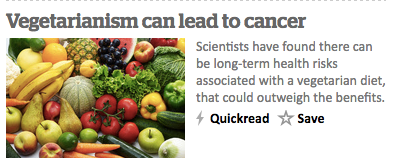Hold the lettuce
Q: Did you see vegetarian diets cause cancer now?
A: No.
Q: The Herald site front page: headline Vegetarianism can lead to cancer?
A: No
Q: The teaser: “Scientists have found there can be long-term health risks associated with a vegetarian diet, that could outweigh the benefits.”?
A: Well, it depends on what you mean by ‘long-term’, for a start.
Q: How long-term?
A: Centuries, perhaps thousands of years.
Q: How did they find people who were thousands of years old? And why isn’t that the headline?
A: Not people.
Q: I refuse to believe in century-old lab mice.
A: Human populations.
Q: Ok, so if we click through to the story (from the Telegraph) it seems they’re saying your great-grandparents eating lettuce gives you harmful mutations?
A: That’s what the story says, but it’s not what the research says. The research suggests that a mutation that with a modern diet might increase cancer risk arose randomly a long time in the past and became common in a South Asian population where vegetarian diets have been common.
Q: How did the mutation become common?
A: Because it wasn’t true that the long-term health risks outweighed the benefits — there’s genetic evidence of ‘selection’ in the evolutionary sense, meaning that people with the mutation had more descendants on average.
Q: How much health risk did they find?
A: They weren’t looking at health risks
Q: But “long-term health risks” and “can lead to cancer”?
A: Sadly, yes.
Q: Ok, what were they looking at?
A: They were looking at enzymes that turns one type of fatty acid into another. The mutation makes it easier for the body to synthesis long polyunsaturated acids
Q: Aren’t they good?
A: Some of them, like the DHA and EPA also found in fish, are thought to reduce inflammation and heart disease. But arachidonic acid is thought to increase inflammation, though the American Heart Association isn’t convinced
Q: That’s heart disease. What about cancer?
A: The only links to cancer are pretty speculative — that the mutation could reinforce effects of modern diet in increasing cancer risk. The contribution of arachidonic acid to that is controversial. But it could be real.
Q: Is there actually a higher cancer rate where they got their vegetarian population from, compared to the control population?
A: No.
Q: That ‘arachidonic acid’ thing. Why does that make me think of spiders?
A: Yes, me too. It’s a false cognate: Latin ‘arachis‘, ‘peanut’, not the mythic Greek technologist Aράχνη that arachnids were named for.
Thomas Lumley (@tslumley) is Professor of Biostatistics at the University of Auckland. His research interests include semiparametric models, survey sampling, statistical computing, foundations of statistics, and whatever methodological problems his medical collaborators come up with. He also blogs at Biased and Inefficient See all posts by Thomas Lumley »

Great fisking. The Herald headline reminds me of a description I once read of the Daily Mail as “a newspaper on a mission to divide every object in the world into something that either causes cancer or cures it.”
9 years ago